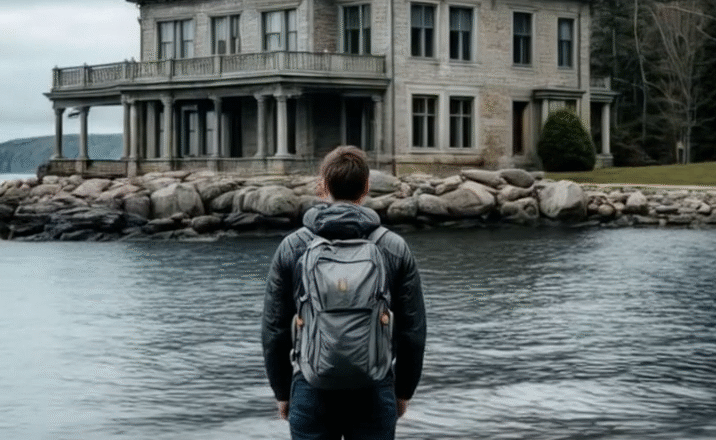The phone rang as Elliot Row stood at the stove. An omelet was sizzling deliciously in the pan, spreading the aroma of garlic and butter. Elliot wiped his hands on a towel and looked at the number—unknown.
“Hello?” he said shortly, without taking his eyes off the food.
– Mr. Row, this is your family’s notary. You must come to see me tomorrow morning. It’s about an inheritance. You must sign the documents.
Elliot was surprised—his parents were alive and well. He didn’t ask any questions, just nodded as if the other party could see it, and hung up.
The morning was misty, the city shrouded in a gray veil. On the way to the notary’s office, Elliot felt disoriented, which soon turned into anxiety. The man was already waiting for him at the entrance:
— I understand that this all sounds unexpected. But if it were a regular matter, I would not bother you.
It was eerily quiet inside. The normally bustling place was now filled only with the sound of footsteps on the wooden floor.
“It’s about your uncle, Walter Jonas,” said the notary.
“I don’t have any uncles by that name,” Elliot replied immediately.

“And yet he left you his entire fortune,” the man put an old key, a yellowed map, and a piece of paper with an address in front of him. “It’s a house on the water. It belongs to you now.”
The house was in the middle of Lake Konoma in Connecticut. Elliot had never heard of such a place, or of such an uncle. But something had gotten to him—that special feeling when curiosity wins out over doubt. An hour later, he was on his way.
The lake was surprisingly calm. In the middle, as if rising from the water, stood a large, old house. In a local café, he tried to ask older men:
— Excuse me, do you know who previously lived in this house in the middle of the lake?
One of them looked away:
— We don’t talk about that house. We don’t go there. It should have disappeared years ago.
At the boat rental shop called June’s Boats, a woman with a tired face looked at him carefully.
“I inherited this house. I need a boat,” Elliot said, handing over the key.
“No one swims there,” she replied quietly. “This place scares many people. Me too.”

But he didn’t back down. Finally she agreed:
– I’ll take you. But I won’t wait. I’ll come back tomorrow.
The house towered over the water like a forgotten fortress. The door opened with a prolonged creak. Inside, it smelled of dust and freshness at once. Rays of light streamed through the curtains, and portraits hung on the walls. One of them particularly caught my attention—a man on the shore of the lake, with the same house behind him. Caption: Walter Jonas, 1964.
In the library, shelves full of books with notes in the margins. In the study, a telescope and notebooks with observation notes, the last one only a month old. In the bedroom, dozens of stopped clocks, and on the dresser, a locket with a photo of a baby and the inscription: “Row.”
There was a note on the mirror: “Time reveals what has been forgotten.”
In an old newspaper box in the attic, he found a clipping with a note: “Middletown Boy Missing, Found Alive.” 1997. Elliot paled—it was him.
He couldn’t sleep for a long time that night. His mind was filled with questions: who was Walter Jonas? Why had no one mentioned him? And what significance had he had in his life?

Late at night he heard a noise. With a flashlight he went downstairs and behind the tapestry he saw a metal door. It led down, under the house, under the water. There was a long corridor with drawers, one of them marked “Row”. Inside – letters addressed to his father:
“I tried. Why are you silent? It’s important to him. To Elliot…”
At the end of the corridor – a door with a sign: “Elliot Row Only.”
The door opened. There he found the letters.
“Hi, Elliot. If you’re reading this, it means I’m gone. My name is Walter Jonas. I’m your biological father.”
He described how he and his mother were scientists. The mother died in childbirth, and he, frightened, gave the child to his brother to raise in safety. But he watched him all the time—from a distance.
“You have grown into a good, strong man. Better than I could have imagined. This house is yours now. I apologize for my silence and fear. I have always been there, though invisible.”
Elliot sat in silence for a long time, then went upstairs.

The next morning there was a boat waiting for him. June frowned.
– Everything’s all right?
— Now yes. I understood a lot.
At home he spoke to his parents. They listened to him in silence. His mother whispered:
— Forgive us. We thought it was best.
“Thank you,” he replied. “I know it wasn’t easy.”
A few weeks later, he returned home. Not to live there, but to breathe new life into it. He opened the Center for Climate and History Research there. Children ran through the hallways, neighbors came in with smiles. The house, once full of secrets, became a place of knowledge and discovery.
This story is fictional and any resemblance to real events or people is coincidental.
